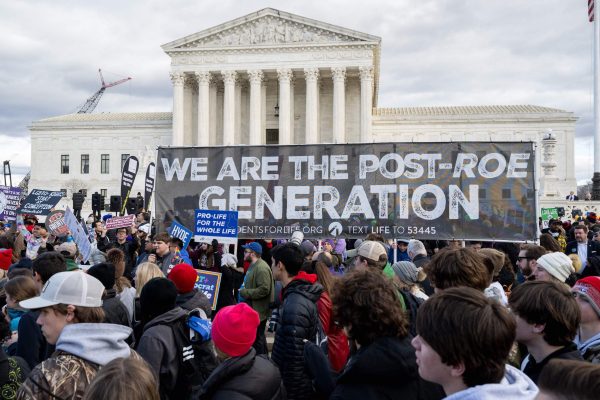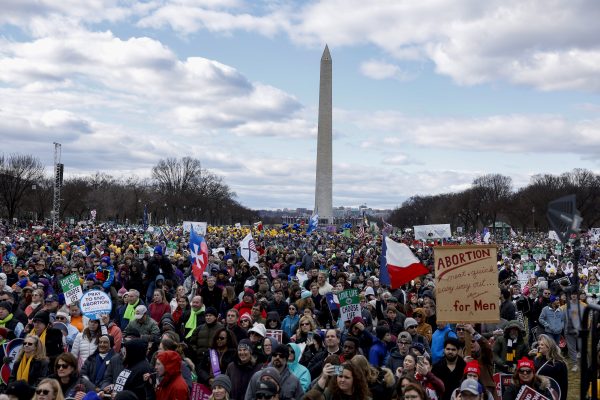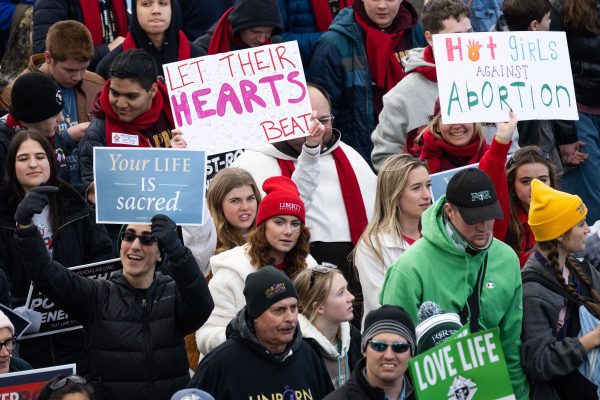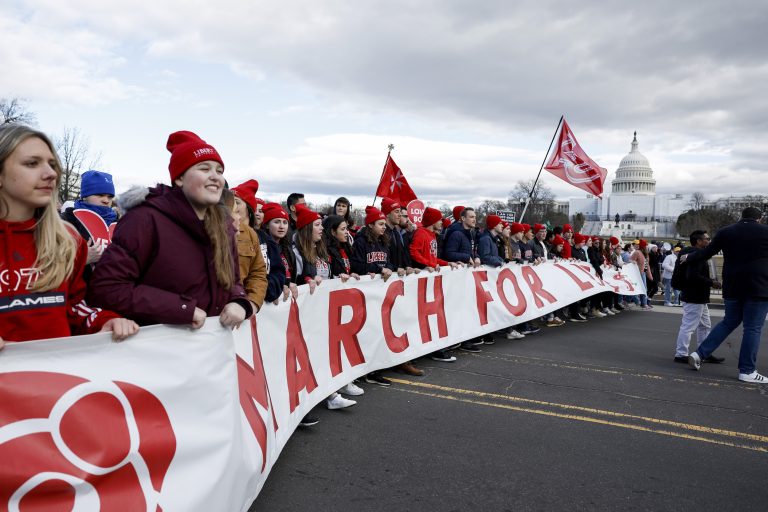The national effort to protect unborn children continues as pro-life activists held their first annual “March for Life” since the historic overturn of Roe v. Wade last June after nearly half a century of abortion being mandated as legal across the United States.
Held on Jan. 20, the March for Life attracted tens of thousands of people to Washington, D.C. Participants gathered peacefully on the National Mall, where activists gave speeches, after which the demonstrators marched through the streets.
Many of the paradegoers held signs like “It’s a Child, Not a Choice,” or “I Am The Post-Roe Generation.”


Speaking at the rally, president of the March for Life Education and Defense Fund Jeanne Mancini said the March was a “somber reminder of the millions of lives lost to abortion in the past 50 years,” and also “a celebration of how far we have come and where we as a movement need to focus our effort as we enter this new era in our quest to protect life.”
House Majority Leader Rep. Steve Scalise (R-La.) also gave remarks, encouraging pro-life Americans to focus on “the mission” of protecting the unborn.
READ MORE
- Dick’s Sued for Funding Employees Seeking Abortions, but Not for Giving Birth
- Plummeting Birth Rates in the US Leave Experts Mystified
- The ‘Most Fatherless Generation’: California Pastor Describes the Consequences of a Growing Crisis
Success
You are now signed up for our newsletter
Success
Check your email to complete sign up
A small number of counter-protesters showed up at the event, holding signs with slogans like “Bans off our Bodies” or “I Will Aid & Abet Abortion.”
The debate around abortion is a major social issue reflecting the deep political division among Americans. The right to terminate one’s pregnancy has been championed by the U.S. left for decades, resulting in strong backlash from the conservative camp and people of faith.
Major religions view procreation as a divine blessing and duty. The Bible teaches Christians to “be fruitful and multiply,” while the ancient Chinese held that people had an obligation to sire and rear children in honor of one’s ancestors and heaven. In East Asia, a newborn is traditionally regarded as being one year old at the moment of birth, while most cultures respect pregnant women as being “with child.”
Supporters of abortion often cite women’s rights, economic necessity, or overpopulation as reasons for its legalization. Some argue that life begins at birth, rather than in the womb when an egg is fertilized by sperm.
Continuing debate
On Jan. 22, 1973, the landmark court case Roe v. Wade saw rights to abortion made mandatory across all 50 U.S. states; the ruling was further reinforced in later cases.
June 24, 2022, the Supreme Court ruled 5–4 in Dobbs v. Jackson Women’s Health Organization, finding that abortion is not a right protected by the U.S. Constitution, leaving the matter to be decided by state governments.
Multiple Republican states moved to enact laws restricting or banning abortion, while some Democrat-run states offered more explicit legal protections for women seeking to end the lives of their unborn children.
- Ruling Clears Louisiana to Enforce Near-Total Abortion Ban
- Pro-Abortion Rioters in Portland Smash Up Democrat Pregnancy Center
- Deconstructing the US Gas Stove Controversy
In a proclamation for the 50th anniversary of Roe v. Wade, U.S. President Joe Biden criticized the Supreme Court’s 2022 ruling as “extreme,” saying that Roe was a “balanced decision” and pledging that he would use his presidential powers to protect abortion where possible.
Republican lawmakers have proposed bills to extent restrictions on abortion and to pull funding from organizations that facilitate termination of the unborn.


The day of the rally, on Jan. 20, Rep. Lauren Boebert (R-CO) proposed a draft bill that aims to place a one-year moratorium on federal funding to Planned Parenthood.
“The nation’s largest abortion provider has no business receiving taxpayer dollars,” Boebert said in a Jan. 20 press release. “Planned Parenthood claims these funds go to healthcare for women, but last year, Planned Parenthood performed a record number of abortions while also reducing the number of well-woman exams and breast cancer screenings it performed.”
Whether or not abortion should remain normalized or acceptable strikes at the heart of the moral and ideological disagreements obtaining across much of the developed world — accompanying the startling erosion of fertility and family cohesion in industrialized nations.
- China’s 3-Child Policy Attempts to Address Looming Population Crisis
- ‘Critical situation’: Japanese Births Continue to Decline, Beating Last Year’s Record Low
- Leaked Pfizer Executive Emails Confirm Aborted Fetal Tissue Used in COVID Vaccine Testing
For the progressive left, restrictions on abortion stand in the way of egalitarian social causes, such as the legal and cultural equality of the sexes. Beyond that, prevailing leftist ideology seeks to erase the scientific division between men and women, seeing biological sexual differences as a spectral gradient rather than naturally distinct categories.
Such ideological developments have elicited reflection among conservatives and traditionalists, many of whom increasingly understand the issues in terms of faith and spirituality, as opposed to purely materialist or secular explanations.







